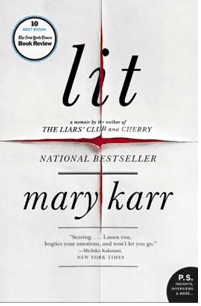 “Faith is a choice like any other,” Mary Karr wrote in Lit, a memoir about alcoholism and redemption. More than anything, Lit is about making choices – the difficult ones. The title reflects a choice people make every day, and the consequences.
“Faith is a choice like any other,” Mary Karr wrote in Lit, a memoir about alcoholism and redemption. More than anything, Lit is about making choices – the difficult ones. The title reflects a choice people make every day, and the consequences.
Anyone who has read The Liars’ Club knows about Karr’s hardscrabble childhood and family history of alcohol abuse and mental illness. To Karr, making a gratitude list seemed a crazy choice, let alone praying requests to a God in whom she did not believe. But that’s exactly what she did. She started with The Prayer of Saint Francis as a call-and-response with her young son.
Lord, make me an instrument of thy peace. Where there is hatred, let me sow love; Where there is injury, pardon; Where there is doubt, faith; Where there is despair, hope; Where there is darkness, light; Where there is sadness, joy.
Mary Karr chose faith, and things started to change.
Life, which had seemed so precarious especially after her divorce (in part, a consequence of her alcoholism), improved. After years of odd jobs and adjunct teaching, Karr earned a tenure-track position at Syracuse University, where she currently holds an endowed chair. She published a book of poetry then The Liars’ Club, thanks to encouragement from her mentor Tobias Wolff and his agent. Karr finally made ends meet, for herself and her son, and bought a car.
She began to see God’s dream for her – and something else.
“I want to see all – my sin and my gift.” (Richard Rohr)
I suspect most of us would like to see our gifts and forget our sins, especially pride, which a spiritual mentor of Karr’s called “sinfulness in all its ugliness.” Karr found this ugliness not through prayer but its absence. She came face-to-face with what she called the “Adversary,” her anger about past hurts.
Mary Karr chose to see all, then read scripture and prayed the last part of Saint Francis’ Prayer:
O divine Master, grant that I may not so much seek To be consoled as to console, To be understood as to understand, To be loved as to love; For it is in giving that we receive; It is in pardoning that we are pardoned; It is in dying to self that we are born to eternal life.
Amen. (Notice the word “love” shows up twice in this prayer – another choice.)
P.S. Thank you to my new friend for sharing Lit.



Although I do find Mary Karr’s writing to be quite good, I often find myself wondering when does a writer have to stop writing memoirs and move on to the next project. I can’t imagine it’s an easy decision to move on to another genre, but at the same time – couldn’t one use similar stories and slide into the fiction category with a certain sense of ease?
I would love to see Jeanette Wells and Augusten Burroughs slide into fiction.
That’s an interesting question – when to stop writing memoir and try another genre. I think Mary Karr sees herself as a poet first then a memoirist. Will she or others slide into fiction? What about the other way around – fiction writers sliding into memoir. I love Hilary Mantel’s historical fiction (Wolf Hall, Bring Up the Bodies) but her memoir Giving Up the Ghost seemed flat. Perhaps writers are more suited to a particular genre. Thanks so much for your comment!